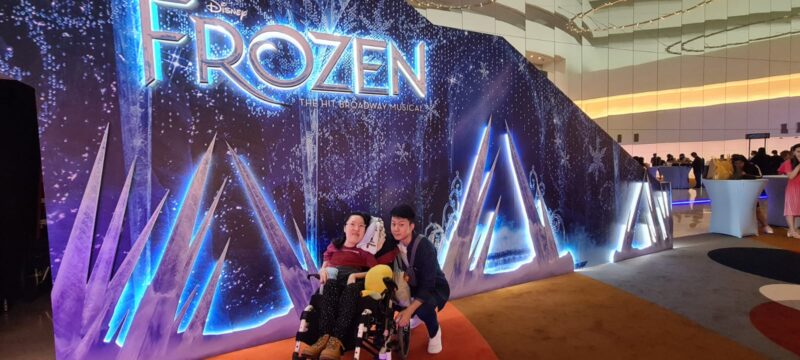Can I still take on an acting career with SMA?


My voice was off-pitch. I was too nervous. Though the casting directors for Singapore’s nationally televised talent show for children, “One Minute of Fame,” gave no obvious reaction, I realized the problem the second air left my lungs.
Still, with all the boldness of an 8-year-old covered in makeup who’d spent hours practicing the song “Breaking Free” with her mum, I did my best to secure a position in the semifinals.
Before I knew it, the audition was over. My mum wheeled me out of the audition room. When we got home, I tried to remember what happened before the tryout.
Two of Singapore’s local actors had showed up as a treat to the kids auditioning, and one of them offered to look after me after he overheard that we’d accidentally left my Walkman in the administration room. Somehow, our conversation snowballed into him calling the other actor over and asking her and the other kids to listen to me sing. The other kids glared at me, clearly envious of the attention I was getting. My mum returned, and the doors to the audition room opened shortly after.
I clung to the confidence I’d had for days before the audition and convinced myself I did well enough to get into the semifinals. Every phone call my mum received made my heart hammer like a hummingbird. But the casting directors never called back.
That was the beginning and end of my TV career.
Lights, camera … SMA?
Actresses Lucy Liu and Michelle Yeoh were my ultimate role models in my earliest memories. Asian actors weren’t as prominent in Hollywood in the 1990s and 2000s as they are now. There were few “Crazy Rich Asians” on the red carpet. Liu and Yeoh were exceptions — I saw them everywhere in the Hollywood films my Singaporean dad showed me. They’d conquered the landscape, despite the limited number of roles for Asian actors, and I wanted to follow in their footsteps.
“I’m going to be the next famous Asian actress, and I’ll be the first in a wheelchair,” I naively thought when I was barely out of my toddler years.
At first, I was interested in acting because I heard leads were paid sums of money too large for my 3-year-old brain to comprehend. But as I grew up and consumed more films, TV shows, and the rare live performance, I became fascinated by the concept of acting itself. It wasn’t just about playing pretend, it was about getting to step outside of myself and into someone else’s shoes for a while. I wanted to be someone who could connect with audiences.
And musicals heightened that concept for me, so combined with my love for music, I wanted to be a singer, too. Hence, I performed “Breaking Free” for a talent show audition.
SMA inevitably got in the way of my dreaming and the dreams themselves. Growing up also meant gaining awareness of my disability and how society treats people with disabilities. I learned why I never saw a disabled actor on screen. (Hint: It’s the ableism.) Even though it’s likely I didn’t make the semifinals of “One Minute of Fame” because I was off-pitch, my internalized ableism still tells me that my disability was a factor in the casting directors’ decision, all these years later.
The other kids performed highly physical auditions, like salsa dances and magic tricks, after all.
Returning to La-La Land
As time flew by, my dreams of becoming an actress and my short-lived TV career became nothing but an anecdote I’d pull out for fun in conversations. But recently, I’ve been reconsidering whether I’m truly done with wanting to act.
The morning of Feb. 4, the day of the book launch for an anthology I contributed to, “Not Without Us: Perspectives on Disability and Inclusion in Singapore,” I decided to watch interviews with Yeoh after her historic Oscar nomination as the first Asian woman up for best actress. Little did I know it, but that afternoon, another contributor to “Not Without Us” — Alvan Yap, a Deaf Singaporean playwright and former teacher — would speak about his experience writing the first play about special education in Singapore.
On Feb. 5, still high on the book launch, I watched the stage adaptation of “Frozen” with my dad and brother. It was my first experience of a musical that had been on Broadway, and it rekindled my love for Elsa’s story. In short, it was as magical as a Disney show should be.
By experiencing all of that back to back in a single weekend, I remembered why I loved the craft of acting. And more important, I remembered that times have changed.
I once said I wouldn’t ever be a professional writer. Why should I say the same about stepping into an audition room again?

Sherry and her brother Gabriel at the musical “Frozen” in Singapore. (Courtesy of Sherry Toh)
Note: SMA News Today is strictly a news and information website about the disease. It does not provide medical advice, diagnosis, or treatment. This content is not intended to be a substitute for professional medical advice, diagnosis, or treatment. Always seek the advice of your physician or other qualified health provider with any questions you may have regarding a medical condition. Never disregard professional medical advice or delay in seeking it because of something you have read on this website. The opinions expressed in this column are not those of SMA News Today or its parent company, BioNews, and are intended to spark discussion about issues pertaining to spinal muscular atrophy.
The post Can I still take on an acting career with SMA? appeared first on SMA News Today.




